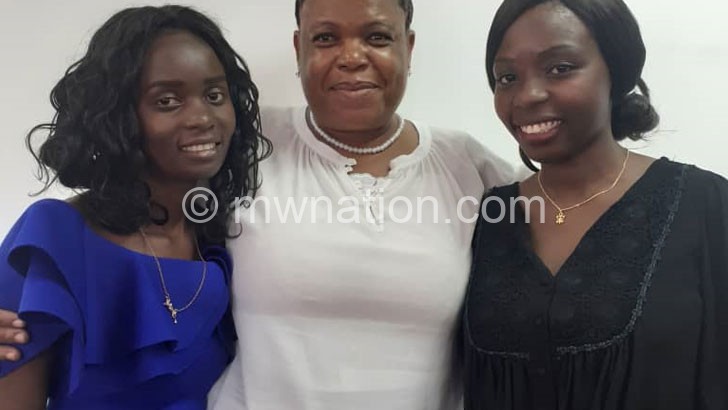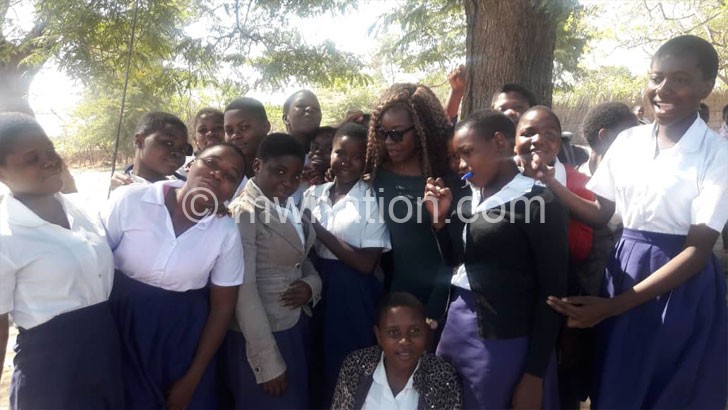As the world is going through the pandemic of the novel coronavirus, many people are frustrated and complaining about the disruption of their dreams.
But that is not an issue for a young and vibrant woman, Temwani Chilenga.

At 24, she is highly passionate about vulnerable children and has managed to source funds from friends in the USA to support children.
Temwani has done a lot in her community even constructing houses for the orphans and providing necessities so that they still go to school.
“I chose to work with the vulnerable children because I want them to have a bright future and enjoy their childhood just like other children. They are important in our community because they belong here and they have to grow up and become useful citizens,” she says.
She is motivated to do what she does because of the hard life different children face every day.
“I am optimistic about my community and I have helped built seven houses for orphans because I noted that some children live by themselves without parents or guardians. That broke my heart and I thought of doing something. Their homes looked so bad and some homes fell when it was raining,” she said.
This initiative has benefited 20 orphans and other children raised by single mothers.
The teacher has managed to source funds for plastic sheets to cover some homes, buy food, clothes, shoes, blankets, mats, mattress, pots and other things.
Temwani says she identifies the children from different places such as schools and markets.
“At school, I noted certain things that made me do something about them and make a difference. I usually meet some children in the same clothes every day, with no shoes or coming to school with old and torn notebooks. They include failing to pay K500 for examination, failing to keep themselves warm when it’s cold.
“Many experience frequent absenteeism to collect plastic bottles for sell at K5 and K10 to raise money for their needs as we are selling indigenous vegetables during rainy season,” she said.
The sad part, according to Temwani, is that they don’t make more than K300 a day. Sometimes no one buys from them.
She further observes that the trend is common in this country, not only to vulnerable children, but even those whose parents don’t have jobs and can’t afford their needs.
Temwani adds that sometimes they do it to support their families.
“I got the funds from USA teachers. I knew the teachers from a certain Facebook group. They didn’t just start raising funds, they started with sending school supplies to my learners then later, they sent money because it was expensive to send things here. Some other teachers from Australia, Canada and Ireland have been helping too. Most funds were raised when I was invited to United States and I used the money to buy water units for people who use dirty water from the river. Part of the money was used to provide tap water to other people then. When I returned, that’s when I started building homes,” she explained.
Despite the Covid-19 pandemic, Temwani is still teaching lessons to her class and observing social distances to the learners. She shall finish on July 10 then start again later.
“I teach three days per week. I write on charts and place on walls of their homes. Not more than 10 children per house and they wash hands with soap before anything. Then I mark their work and give them books to read. Those who haven’t learnt how to read draw and colour while others practise reading with the help from the ones who already know.
“I keep them busy so that they don’t move around markets and pick things. They can play at home sometimes because children naturally play, but that is after school work is done. And at the end of the day, I just want to make sure my children are not left behind. I call the vulnerable my children,” says Temwani.
She said she has never been afraid to achieve hard things and the biggest factor that has helped her achieve her goals is using funds and donations accordingly.
“The funds were raised for the poor children and not for me so I had to use them appropriately because it is inhuman to misuse funds and a disgrace,” she adds.
Temwani says she lives a simple life and never compares herself with anyone, helping without expecting anything in return, loving people for who they are and not what they own.
She likes spending time with her family. The children are her family too so she also spends more time with them too.
Temwani is the fourth born in a family of six from Charles and Anganile Chilenga. She grew up in Blantyre and did her primary at Kachanga Primary School in Chileka. Later she went to our Lady of Wisdom Secondary School then Maranatha Academy.
“I am a teacher by profession at Chambu Primary School in Area 25. I did my training at DAPP Dowa Teachers Training College (TTC) and I’m upgrading at DMI St John the Baptist University in Lilongwe. I never thought of becoming a teacher when I was a child because I wanted to be a journalist and I made the decision when I was growing up,’’ she said.
Temwani says she has been teaching for three years and enjoys teaching itself, but mostly interacting with children of different ages.
Temwani said shelving her journalism dream was the hardest thing she ever did in her life, but she loves being with the children and teaching.
She said people who want to succeed should ignore people who may pull them down.
Her advice to young girls is to put God first in everything, dream big and work hard. n














